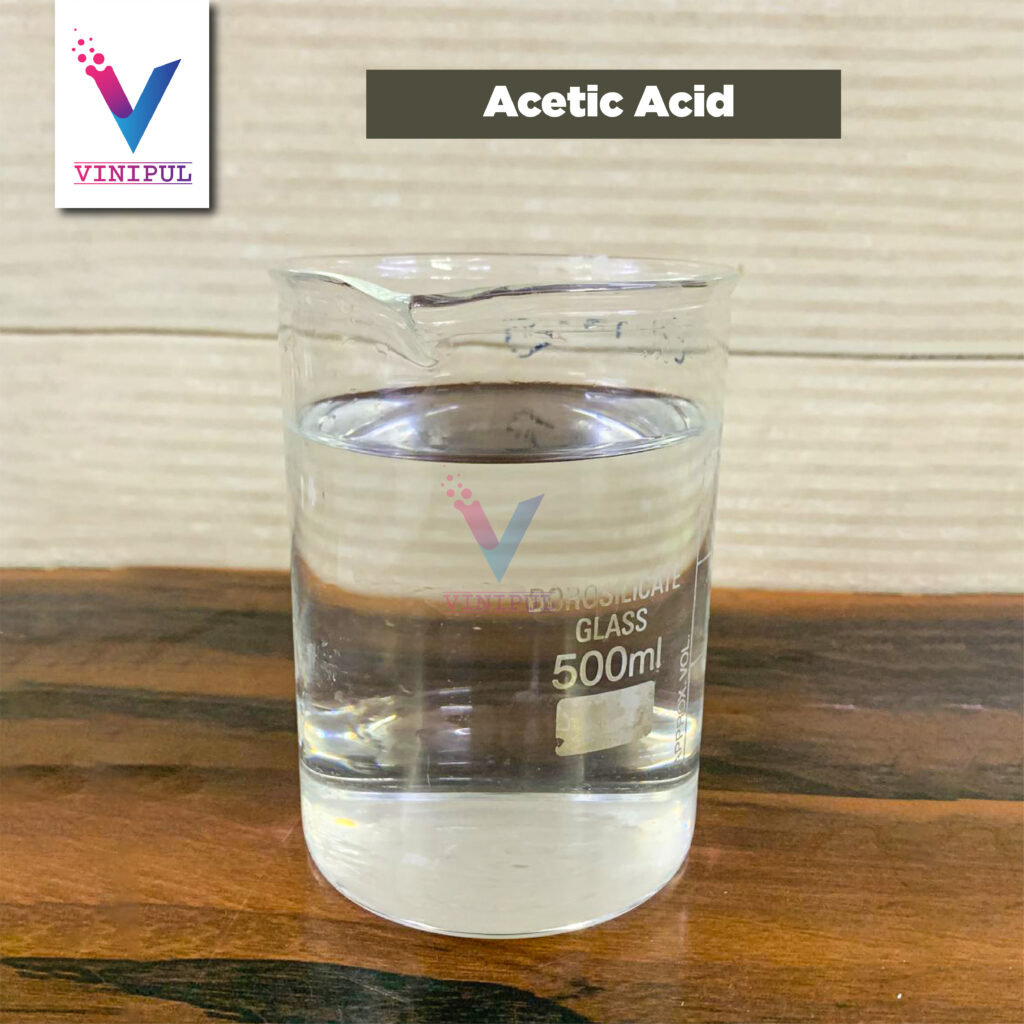Acetic Acid Manufacturer and Supplier
CAS No.: 62-54-4 | EC Number.: 200-540-9 | Molecular formula.: C4H6O4.Ca, Ca(C2H3O2)2, C4H6CaO4
Acetic Acid
Acetic Acid Manufacturers, Acetic Acid Suppliers, Acetic Acid Formula, Acetic Acid MSDS, Acetic Acid SDS, Acetic Acid Exporter in Mumbai, India.
Vinipul Chemicals Pvt. Ltd., a renowned manufacturer, supplier, and exporter based in India, specializes in producing high-purity Acetic Acid (CAS No. 64-19-7). As a leading Acetic Acid manufacturer, our company is widely recognized for its commitment to delivering top-quality specialty chemicals with exceptional accuracy in composition and an absence of impurities.
To ensure the highest standards of purity, we utilize superior-quality chemicals and employ state-of-the-art manufacturing equipment, adhering to international industry guidelines. As a reliable Acetic Acid supplier, we take pride in offering that exhibits superior quality, precisely meeting the required composition specifications, and boasting an extended shelf life.
By choosing Vinipul Chemicals Pvt. Ltd., you can trust that you are obtaining Acetic Acid of the finest grade, manufactured with meticulous attention to detail and quality control. As a prominent Acetic Acid manufacturer in India, We prioritize the satisfaction of our customers by consistently delivering products that meet their stringent requirements.
What is Acetic Acid?
Acetic acid is a colourless liquid compound with a sour taste and a pungent smell. Its chemical formula is CH3COOH, and it is also known as ethanoic acid. Acetic acid is a member of the carboxylic acid family and is considered a weak acid. It is an essential chemical compound used in various industries and everyday applications. One of the most common uses of acetic acid is in the production of vinegar. Vinegar is essentially a dilute solution of acetic acid, typically containing around 5-8% acetic acid by volume. It gives vinegar its characteristic sour taste and is widely used as a condiment and food preservative.
Acetic acid is also employed in the manufacture of various chemicals, solvents, and polymers. It is an important intermediate compound in the production of vinyl acetate monomer (VAM), which is used in the production of adhesives, paints, and coatings. Acetic acid is utilized in the production of cellulose acetate, a thermoplastic used in films, fibers, and cigarette filters. In addition to its industrial applications, acetic acid finds uses in laboratories as a reagent for chemical reactions. It is a common component in cleaning products and is utilized for descaling, removing mineral deposits, and disinfecting surfaces.
Acetic Acid Details
This table provides information about Acetic Acid, a chemical compound with the CAS No. 64-19-7 and EC Number. 200-580-7. The table also lists various Acetic Acid common name and synonyms. The table contains Acetic Acid structure, Acetic Acid solubility and molecular formula. Acetic Acid ph. value is also mentioned in the table. Acetic Acid is commonly used in various industries in different applications.
Specifications
| Chemical name | Acetic Acid |
| CAS No | 64-19-7 |
| EC Number | 200-580-7 |
| Commercial name / Synonyms | acetic acid, ethanoic acid, 64-19-7, Ethylic acid, Acetic acid, glacial, Glacial acetic acid, Methanecarboxylic acid, Acetic acid glacial, Vinegar acid |
| Molecular formula | C2H4O2 CH3COOH |
| Chemical Structure | 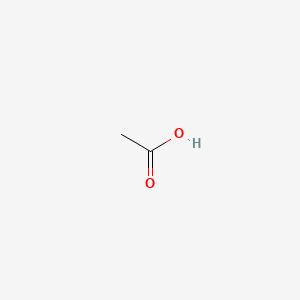 |
| Melting Point | 61.9 °F (NTP, 1992) |
| IUPAC Name | acetic acid |
| Physical Form | Liquid |
| Physical Appearance | Clear colourless liquid. |
| Solubility in water | Miscible |
| pH | Aqueous solution 1.0 molar = 2.4; 0.1 molar = 2.9; 0.01 molar = 3.4 |
| Packaging Details | 25 kg / 50 kg / HDPE packaging bags / Drum/ As per Client’s requirements |
Computed Properties
The table provides various properties of a chemical compound, including molar mass of Acetic acid, hydrogen bond acceptor counts, an exact mass and mono-isotopic mass, heavy atom counts, and a topological polar surface area. These properties are useful in identifying and characterizing the compound for various purposes in industries such as pharmaceuticals and chemicals.
| Property Name | Property Value |
| Molecular Weight | 60.05 g/mol |
| XLogP3-AA | -0.2 |
| Hydrogen Bond Donor Count | 1 |
| Hydrogen Bond Acceptor Count | 2 |
| Exact Mass | 60.021129366 g/mol |
| Monoisotopic Mass | 60.021129366 g/mol |
| Heavy Atom Count | 4 |
| Topological Polar Surface Area | 37.3Ų |
| Complexity | 31 |
| Covalently-Bonded Unit Count | 1 |
| Compound Is Canonicalized | Yes |
Related Compounds with Annotation
The table provides information on different chemical structures and their associated names, compound IDs, neighbor types, and annotation types count related to Acetic Acid. The structures mentioned include acetate, acetic acid, beta-alanine, formate, and (aminooxy)acetate. Acetate is described as an ion and is associated with multiple names, while acetic acid is also known as ethanoic acid and vinegar acid. Beta-alanine is characterized by various names as well, including 3-Aminopropanoic acid, and formate is noted as an ion and is also referred to as formic acid. Lastly, (aminooxy)acetate has alternative names such as Aminooxyacetate and 2-aminooxyacetate. The table also mentions the compound CID, neighbor type (2D+3D), and the count of different annotation types for each structure.
Structure Image | Structure Name | Compound CID | Neighbour Type | Annotation Types Count |
Take from PubChem | acetate, Acetate Ion, Acetic acid, ion(1-), Acetate ions, 71-50-1 | 175 | 2D+3D | 9 |
| acetic acid, ethanoic acid, 64-19-7, Ethylic acid, Vinegar acid | 176 | 2D+3D | 17 |
| beta-alanine, 3-Aminopropanoic acid, 107-95-9, 3-Aminopropionic acid, Beta Alanine | 239 | 2D+3D | 15 |
| formate, Formic acid, ion(1-), 71-47-6, HCO2 anion, aminate, | 283 | 2D+3D | 8 |
| (aminooxy)acetate, Aminooxyacetate, 2-aminooxyacetate, 2-aminooxyethanoate, 2-(aminooxy)acetate | 285 | 2D+3D | 6 |
Acetic Acid Price
If you are looking to purchase Acetic Acid, it’s important to know the current Acetic acid price in India. Acetic Acid price per kg can vary depending on various factors. Acetic acid suppliers in India offers the best price in the market listed below: –
| Product Range | Price |
| Acetic Acid 30% Water | Rs 100/Kg |
| Dilute Acetic Acid | Rs 41/Kg |
| Glacial Acetic Acid | Rs 112/Kg |
| Acetic Acid 99% | Rs 70/Kg |
Prices shown above are provisional prices and may change due to different market conditions for latest prices
Call Us
+91-932 223 1817
Mail Us
business@vinipulchemicals.com
Types of Acetic Acid
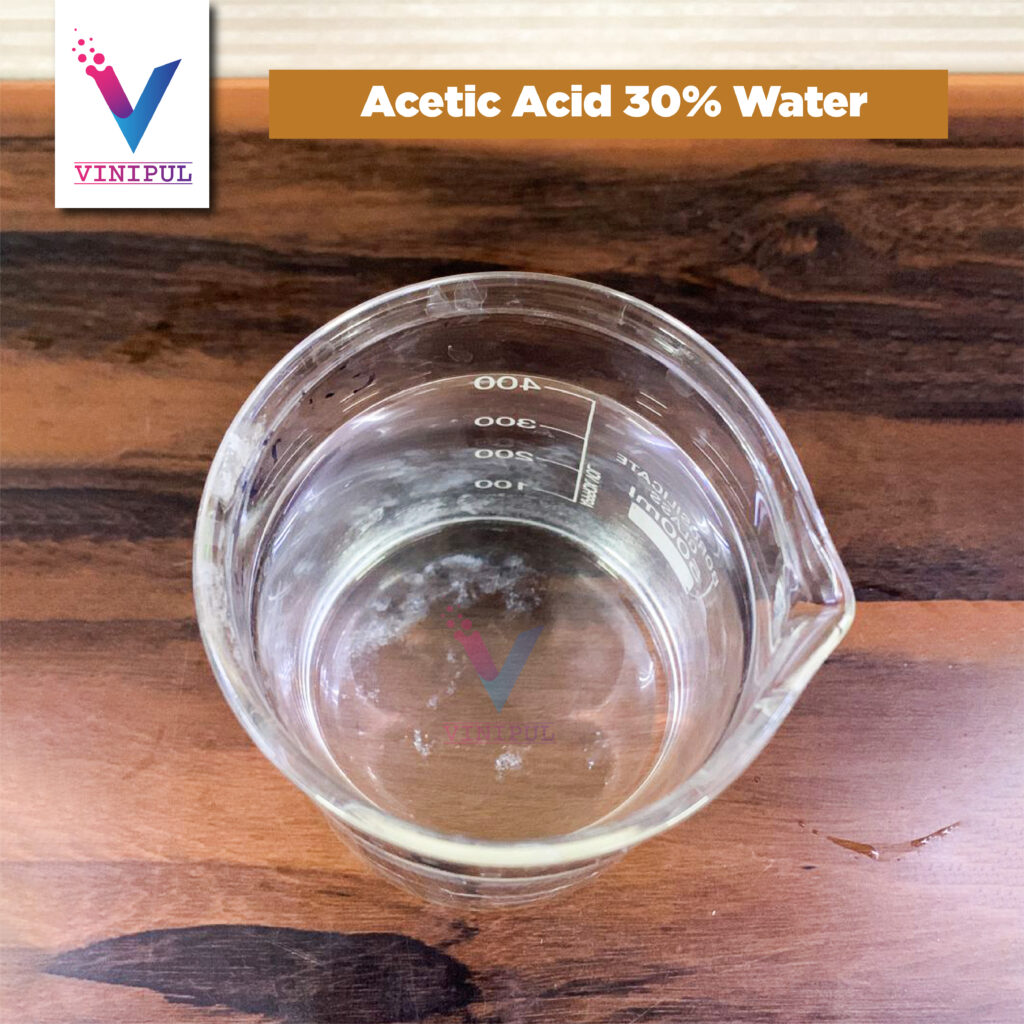
Acetic Acid 30% Water
This refers to a solution of acetic acid that contains 30% acetic acid and 70% water. It is commonly used as a milder concentration of acetic acid for various applications. The presence of water makes it less concentrated and less corrosive compared to higher concentrations of acetic acid.

Dilute Acetic Acid
This acid generally refers to an acetic acid solution with a lower concentration, typically less than 10%. It is commonly used in household applications, such as cleaning or as an ingredient in homemade solutions. Dilute acetic acid is milder and less concentrated than higher strength acetic acid solutions.
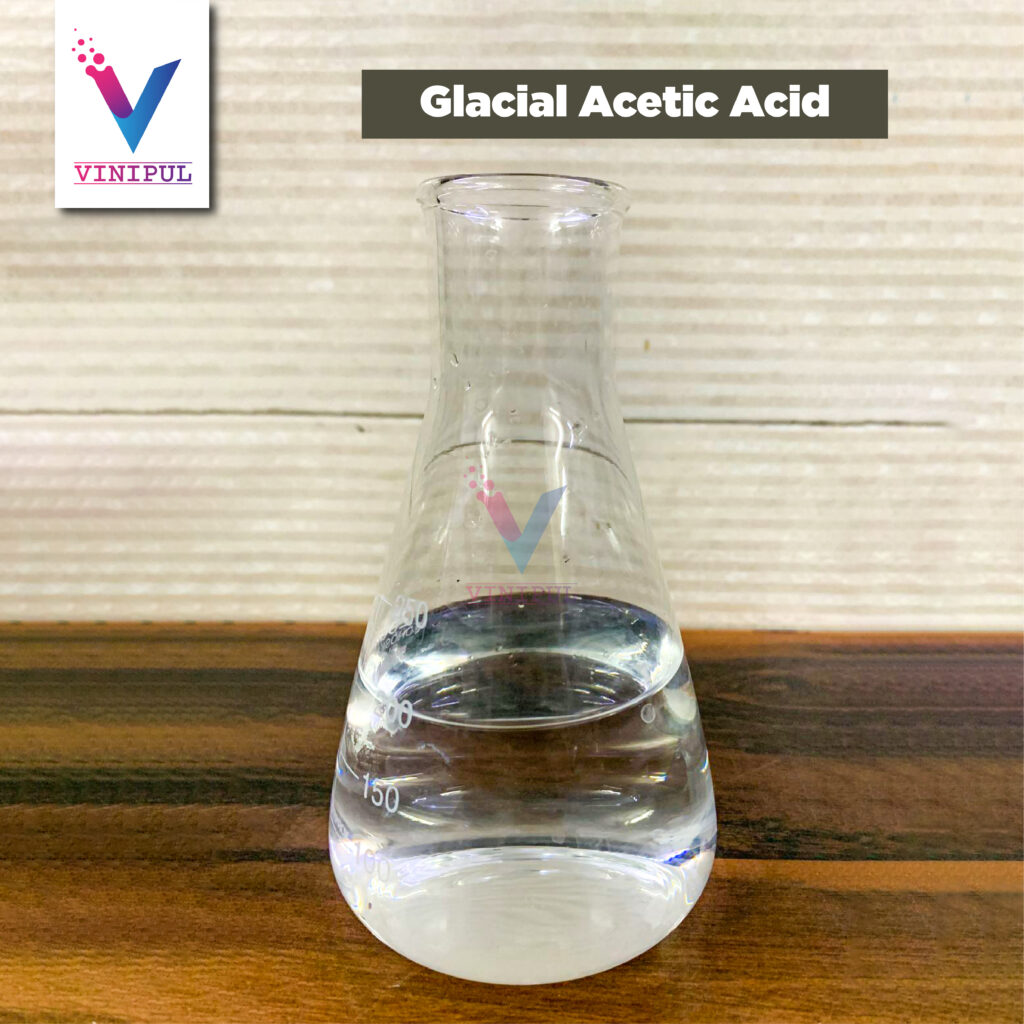
Glacial Acetic Acid
This acid refers to the purest form of acetic acid available commercially, with a concentration of 99%. The term “glacial” refers to its tendency to solidify into crystals at temperatures below 16.6°C (61.9°F). It is a highly concentrated and corrosive form of acetic acid. Glacial acetic acid is commonly used in industrial
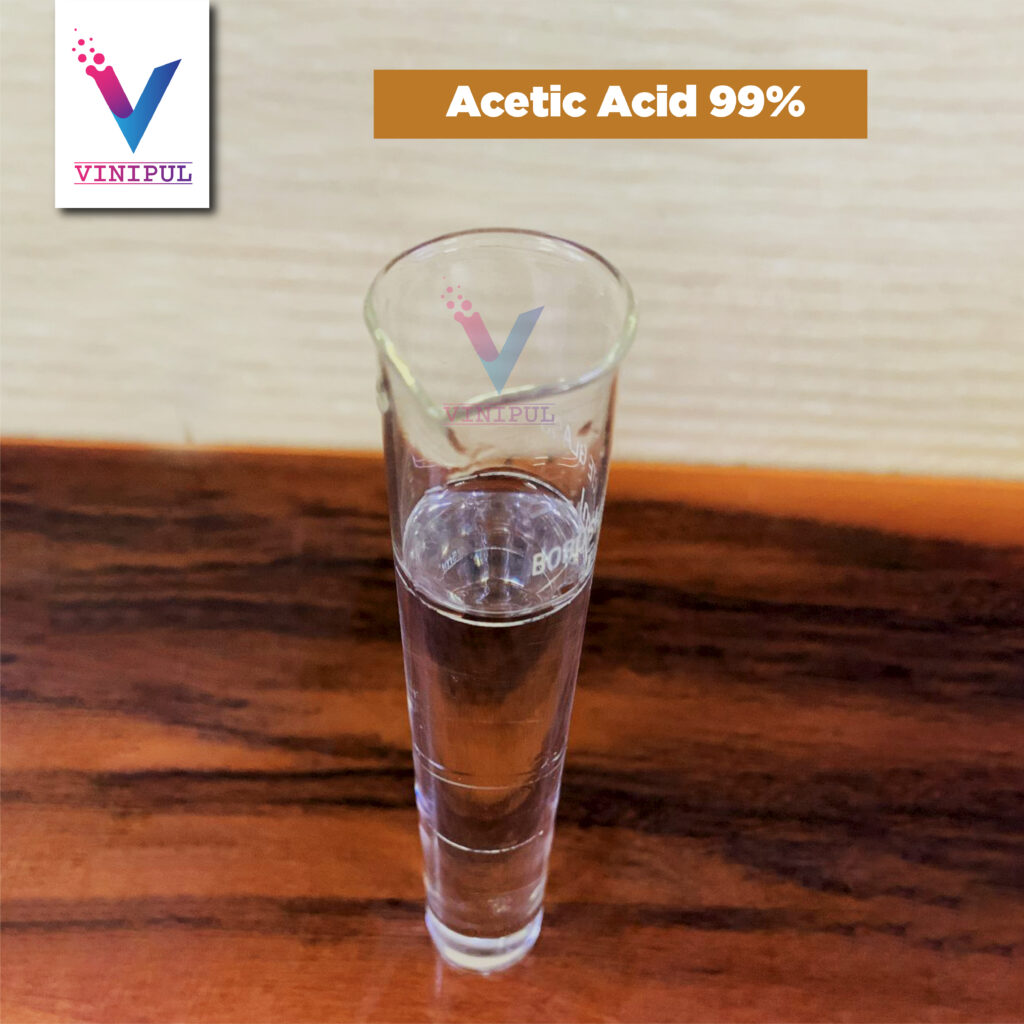
Acetic Acid 99%
This indicates an acetic acid solution with a concentration of 99%. It is similar to glacial acetic acid in terms of its high concentration and corrosiveness. Acetic acid at this strength is utilized in various industrial processes, including the production of solvents, polymers, dyes, and pharmaceuticals. It requires careful handling and safety precautions due to its high acidity and potential hazards.
How to make Acetic Acid solution?
The manufacturing process of acetic acid typically involves the following steps:
- Feedstock Preparation: The primary raw material used for acetic acid production is methanol, although other feedstocks like ethanol or acetaldehyde can also be used. Methanol is commonly derived from natural gas or coal. It undergoes purification processes to remove impurities and ensure high-quality methanol for further processing.
- Methanol Carbonylation: The main method employed for acetic acid production is the carbonylation of methanol. This process involves the reaction of methanol with carbon monoxide (CO) in the presence of a catalyst, typically a metal compound such as rhodium or iridium. This reaction takes place under high temperature and pressure conditions.
- Acetic Acid Formation: During the methanol carbonylation reaction, the methanol and carbon monoxide react to form acetic acid. This reaction is exothermic, meaning it releases heat. The catalyst helps facilitate the reaction and improves its efficiency. Water is usually present as a solvent to control the reaction conditions.
- Purification: After the acetic acid formation, the resulting mixture contains acetic acid, unreacted methanol, water, by-products, and catalyst residues. It undergoes a series of purification steps to separate and remove impurities. Distillation is commonly employed to separate the acetic acid from the other components. Multiple distillation columns are used to obtain high-purity acetic acid.
- Recycling and Catalyst Recovery: In order to maximize efficiency and minimize waste, the unreacted methanol and other by-products are often recycled back into the process. The remaining catalyst is also recovered and reused to minimize costs and environmental impact.
- Final Product: The purified acetic acid is typically concentrated through further distillation to achieve the desired strength. It is then cooled and stored in suitable containers for packaging and distribution. Acetic acid is commercially available in different concentrations, such as glacial acetic acid (99% purity) or diluted solutions like vinegar.
It’s worth noting that variations of this process exist depending on the specific technology and manufacturer. However, the carbonylation of methanol is the most widely used method for large-scale acetic acid production.
Industrial Applications
Acetic acid has numerous industrial applications across various sectors. Some of the key industrial acetic acid uses include:

Textile Industry
Acetic acid is employed in the textile industry for processes such as dyeing and printing. It aids in fixing dyes to fibers, enhancing colorfastness, and providing vibrant and durable coloration to fabrics.
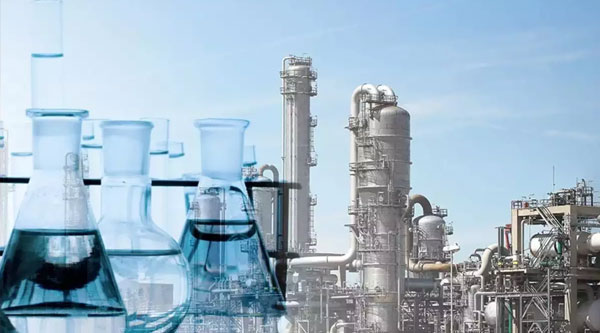
Chemical Manufacturing
It serves as a vital building block in the production of a wide range of chemicals and used in the manufacturing of vinyl acetate monomer (VAM), which is further utilized in the production of adhesives, paints, coatings, and synthetic fibers. Acetic acid is also a precursor in the production of acetic anhydride, which finds applications in the production of cellulose acetate, pharmaceuticals, and dyes.

Food Industry
It plays a significant role in the food industry, primarily in the production of vinegar. Vinegar is a dilute solution of acetic acid, typically containing around 5-8% acetic acid. Acetic acid is widely used as a condiment, food preservative, and flavouring agent. Acetic acid is also used in the production of food additives like esters, which contribute to flavour and fragrance in various food products.

Pharmaceuticals
Acetic acid is utilized in pharmaceutical manufacturing processes. It can be involved in the production of acetaminophen, aspirin, and various other pharmaceutical compounds. Acetic acid is also used as a solvent for certain drugs and in the formulation of pharmaceutical preparations.
These are just a few examples of the industrial applications of acetic acid. Its versatile properties and ability to act as a solvent, reactant, and preservative make it a valuable compound in numerous industries.
What is Acetic Acid used for?
Acetic Acid finds applications in various industries, serving different purposes:
- Plant Growth Regulator: Acetic Acid is utilized as a plant growth regulator, aiding in controlling plant growth and development. It can be employed in agricultural practices, horticulture, and gardening to regulate fruit ripening, control weed growth, and promote rooting in cuttings.
- Vinegar Production: It is a key component in the production of vinegar. Vinegar is a common condiment and food preservative, providing a sour taste to various dishes. Acetic Acid is responsible for the distinct tangy flavour and acidity in vinegar.
- Pharmaceutical Intermediates: Acetic Acid is used as an intermediate compound in pharmaceutical manufacturing processes. It serves as a building block for the synthesis of various pharmaceuticals and active ingredients. Acetic Acid derivatives are employed in the production of medicines and drugs.
- Food Additive: It acts as a food additive, enhancing the taste and preservation of food products and commonly used as an acidity regulator, flavour enhancer, and antimicrobial agent in the food industry. Acetic Acid and its salts (acetates) are utilized in food processing, preservation, and pickling.
- Petroleum Production: Acetic Acid finds application in the petroleum industry. It is used in the production of various chemicals and solvents involved in petroleum refining processes. Acetic Acid is also employed in the manufacturing of drilling fluids and as a solvent for certain petrochemical compounds.
These applications highlight the diverse uses of Acetic Acid in different sectors, ranging from agriculture to food, pharmaceuticals, and petroleum-related industries. Its properties as a growth regulator, flavouring agent, chemical intermediate, and solvent make it a versatile compound with significant industrial importance.
Where to Buy Acetic Acid?
If you are looking to purchase Acetic Acid, you can consider contacting Vinipul Chemicals Pvt. Ltd. A reputable company, based in India, specializes in the manufacturing, supplying, and exporting of high-purity Acetic Acid. As prominent Acetic acid manufacturers in India, we are known for our commitment to producing products with accurate composition and minimal impurities, meeting international industry standards. To buy Acetic Acid from Vinipul Chemicals, a leading Acetic Acid suppliers, you can visit our official website or contact the sales team directly. We will provide you with detailed information about product availability, pricing, and shipping options. Additionally, we also assist you with any specific requirements or customization needs related to Acetic Acid.
FAQ's
Acetic Acid should be handled with caution. It is a corrosive substance and can cause irritation and burns if not used properly. Safety measures and appropriate handling guidelines should be followed.
Yes, Acetic Acid is used as a food additive and is commonly found in vinegar. However, it should be used in regulated quantities as per food industry guidelines.
Yes, Acetic Acid is employed in cleaning products and can be used as a natural cleaning agent. It is effective in removing stains, mineral deposits, and disinfecting surfaces.
The concentration of Acetic Acid depends on the intended use. Dilute solutions (e.g., 5-8% in vinegar) are suitable for food and mild cleaning applications, while higher concentrations (e.g., glacial Acetic Acid at 99%) are used in industrial processes.
Yes, Acetic Acid is used as a pharmaceutical intermediate and is involved in the synthesis of various pharmaceutical compounds.
Yes, Acetic Acid is a crucial component in the production of polymers like polyvinyl acetate (PVA) and polyethylene terephthalate (PET), which are used in plastics, adhesives, coatings, and fibers.
The concentration of Acetic Acid depends on the intended use. Dilute solutions (e.g., 5-8% in vinegar) are suitable for food and mild cleaning applications, while higher concentrations (e.g., glacial Acetic Acid at 99%) are used in industrial processes.
Yes, Acetic Acid is used as a pharmaceutical intermediate and is involved in the synthesis of various pharmaceutical compounds.
Yes, Acetic Acid is a crucial component in the production of polymers like polyvinyl acetate (PVA) and polyethylene terephthalate (PET), which are used in plastics, adhesives, coatings, and fibers.
Acetic Acid can be harmful to the environment if released in large quantities. Proper disposal methods should be followed to minimize its impact on the environment.
Acetic Acid can be purchased from chemical suppliers, industrial supply companies, and online marketplaces. Vinipul Chemicals Pvt. Ltd. is a renowned manufacturer, supplier, and exporter based in India, specializing in producing high-purity Acetic Acid.
Acetic Acid should be stored in a cool, dry, and well-ventilated area, away from sources of ignition. It should be kept in tightly sealed containers and away from incompatible substances.
Acetic Acid should be transported following proper safety guidelines. It may be classified as a hazardous material, and compliance with transportation regulations is necessary.
Acetic Acid can cause skin, eye, and respiratory irritation. It is corrosive and can cause burns. Proper personal protective equipment (PPE) should be worn when handling Acetic Acid.
Acetic Acid has a long shelf life when stored properly. However, it is recommended to check the product label or consult the supplier for specific shelf life information.
Depending on the specific application, alternatives to Acetic Acid may exist. It is recommended to consult with industry experts or suppliers to explore suitable alternatives based on the desired outcome and safety considerations.
Market Area
We supply and exports Acetic Acid in all parts of the world such as
Acetic Acid in Africa Countries
South Africa , Nigeria, Kenya, Ghana, Ethiopia, Tanzania, Algeria, Angola, Benin, Botswana, Burkina Faso, Burundi, Cabo Verde, Cameroon, Central African Republic (CAR), Chad, Comoros, Democratic Republic of the Congo, Côte d’Ivoire, Djibouti, Egypt, Equatorial Guinea, Eritrea, Gabon, Gambia, Guinea, Guinea-Bissau, Lesotho, Liberia, Libya, Madagascar, Malawi, Mali, Mauritania, Mauritius, Morocco, Mozambique, Namibia, Nigeria, Rwanda, Sao Tome and Principe, Senegal, Seychelles, Sierra Leone, Somalia, South Sudan, Sudan, Swaziland, Togo, Tunisia, Uganda, Zambia, Zimbabwe.
Acetic Acid in Gulf Countries
Oman, Qatar, Kuwait, Saudi Arabia, Dubai, Bahrain, Iran, United Arab Emirates
Acetic Acid in Asia Countries
Afghanistan, Armenia, Azerbaijan, Bahrain, Bangladesh, Bhutan, Brunei, Cambodia, China, Cyprus, Georgia, India, Indonesia, Iran, Iraq, Israel, Japan, Jordan, Kazakhstan, Kuwait, Kyrgyzstan, Laos, Lebanon, Malaysia, Maldives, Mongolia, Myanmar (Burma), Nepal, North Korea, Oman, Pakistan, Palestine, Philippines, Qatar, Russia, Saudi Arabia, Singapore, South Korea, Sri Lanka, Syria, Taiwan, Tajikistan, Thailand, Timor-Leste, Turkey, Turkmenistan, United Arab Emirates (UAE), Uzbekistan, Vietnam, Yemen
We supply Acetic Acid in all parts of India.
Andhra Pradesh, Arunachal Pradesh, Assam, Bihar, Chhattisgarh, Goa, Gujarat, Haryana, Himachal Pradesh, Jammu & Kashmir, Jharkhand, Karnataka, Kerala, Madhya Pradesh, Maharashtra, Manipur, Meghalaya, Mizoram, Nagaland, Odisha, Punjab, Rajasthan, Sikkim, Tamil Nadu, Telangana, Tripura, Uttarakhand, Uttar Pradesh and West Bengal.
Note: – Please be advised that the information contained in this document is intended for illustrative purposes only. Due to variations in product grade, applications, industries, or uses, the accuracy of the information provided cannot be guaranteed. © Copyright 2023 © Vinipul Chemicals All Rights Reserved (Terms of Use). Reproduction of any material from this site is strictly prohibited without permission. Vinipul Chemicals products are exclusively sold through the company’s website. For precise product specifications and requirements, as well as advice on which products are best suited for your specific application needs, please contact us at business@vinipulchemicals.com Use Terms | Privacy.

